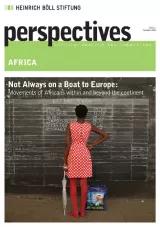Wondering why many Nigerians still embark on long and winding journeys through corrupt officials, barbed wire and deadly seas to reach Europe, Adaobi Nwaubani interrogates the role of religious beliefs in peoples' decision to migrate.

The world was horrified when the bodiesof 26 Nigerian migrant women, aged between 14 and 18, were recovered from the Mediterranean Sea in November 2017, following their attempt to reach Europe in a rubber boat. Many Europeans probably wondered whether this incident would finally deter some migrants from braving the perilous journey across the sea in search of greener pastures in Europe. In 2016 alone, some 37,000 Nigerian migrants had arrived on Italian shores, according to the International Organisation for Migration (IOM). Most of them were from Edo, a majority Christian state in southern Nigeria with a long history of migration to Italy, and more than 11,000 were women. Once they get to Italy, reports the United Nations Office on Drugs and Crime (UNDOC), 90 percent of the women end up in sex work.
Activists in Edo State, however, were never under the illusion that the news would have any effect. “Our experience … is that they listen to you, ask questions, then they tell you that they have heard about it before,” says Augustine Onwubiko, former assistant coordinator of the Committee for the Support of Dignity for Women. To dissuade more women from migrating, her organization takes their campaigns to schools, churches and markets across Benin, the capital city of Edo, showing them videos of migrants who faced horror at sea. “They even tell you worse stories that they’ve heard. Some will say, ‘It is not my portion’,” Onwubiko adds. Phil Inusa of the Girls’ Power Initiative, also in Edo, shares the same view. “We have been showing them different videos [of] those trying to travel and what happens to them on the high sea and they still go,” she said. “It is an issue of ‘try your luck’. They say, ‘That was that one’s destiny. That is their luck.’”
In the same month, the world was once again horrified when CNN published a video of African migrants being sold as slaves in Libya. Between April 2017 and July 2018, the IOM rescued 9,159 Nigerians from Libya and returned them to Nigeria. One of these, 26-year-old Ehis, who had experienced slavery, torture and extortion, admitted that he had heard stories from other migrants long before he embarked on his own ill-fated trip. “I told them, that one is not my portion. Me, I will go,” he said. “It’s a game of luck. God is a god of mercy. Anyone who believes in his own god, let him go and see if he will succeed.”
The vast majority of Africans are deeply committed to the practices and tenets of Christianity and Islam, according to the Pew Research Centre, and large numbers from both religions also believe in making sacrifices to their ancestors for protection and other elements of traditional African religions. These Africans believe that life’s events are determined by unseen spiritual forces, some good and some evil. Good forces are responsible for wealth, health, peace, progress, productivity, longevity and other qualities of a wholesome life. Bad forces are responsible for poverty, disease, motor accidents, earthquakes and sudden death, to mention but a few. Pastors, imams and traditional spiritual priests are usually regarded as the masters of the spirit realm who are able, by their prayers and mysterious interventions, to invoke good forces and to forestall or disable bad ones.
In many cities in Nigeria’s Christian majority south, a glance at the dozens of billboards advertising church programmes will give you an idea of the issues that require concentrated spiritual attention. Pastors organise special services where women can be assured of a man or a child of their own and men can be assured of a promotion at work.
With the battered Nigerian economy, migration to greener pastures abroad has joined the list of good things that people desire. A number of church banners advertise special events where the good forces that enable safe passage – by air, land or sea – can be invoked and the dark forces that harden the hearts of consular and bordercontrol officers can be disabled. One banner in the streets of Benin boldly proclaims what attendees should expect from the forthcoming church event: “Abroad Must Favour My Family This Year!”
During testimony time at church services, people describe their battles and victories over the forces that control the issuance of visas at embassies: “The devil tried to stand in my way, but I kept trusting that the same God who parted the Red Sea for Moses would do it for me.” The entire congregation claps and rejoices, congratulating them for the glorious achievement. These lucky few with legal entry to Europe are usually granted a visitor’s visa that expires in months, rather than an immigrant visa – but everyone knows that they have no plans of returning any time soon.
Across Europe, churches with largely migrant congregations hear similar testimonies. People tell of how they were miraculously able to find work despite not having legal documents, or how they were permitted to remain in the foreign country. Again, their testimonies elicit praise and worship for God.
Juju priests are certainly not left out of this. Some even claim to specialise in helping people cross over to Europe successfully. Migrants come to them before they embark on their journeys, seeking special blessings from the gods to ensure a smooth passage. Some migrants come seeking help to withhold the evil forces that jeopardised the success of others’ trips.
Testimonies of their “powers” also abound. Patience, a former trafficker in Benin, recalls a batch of people for whom she had once arranged travel to Europe via Libya. “They were arrested on their way and locked up,” she said. “When they got to Tripoli and wanted to cross over, policemen arrested them again. They really suffered. We had to send money from Nigeria to those police holding them before they were released. Among this set of people, one of them suffered so much. I had to go out and do some checking. I took his name to a juju priest, and I was told the problem is from his relatives who do not wish him well. That is the reason why he suffered that much.” After some sacrifices to dispel the evil forces invoked by the malicious relatives, the snag in his journey was sorted out, and his journey to Europe was successful. He is now in Italy, selling secondhand clothes to other migrants, and has bought a piece of land back home, she reports.
It is these testimonies that cause faith to rise in the hearts of the faithful and reinforce the confidence of other would-be migrants, who see in them evidence that God is still in the business of doing miracles. Those who did not succeed in their attempts probably did not have enough faith, or did something wrong, or didn’t seek the assistance of a spiritual leader with sufficient authority to command the forces that guard the doors of Western nations. Maybe next time they should try a more powerful priest. And so, no matter how many gory stories of death at sea or hard-hearted visa officials they hear, migrants continue to try, knowing that one person’s luck/portion/destiny/star can indeed be very different from another’s.

